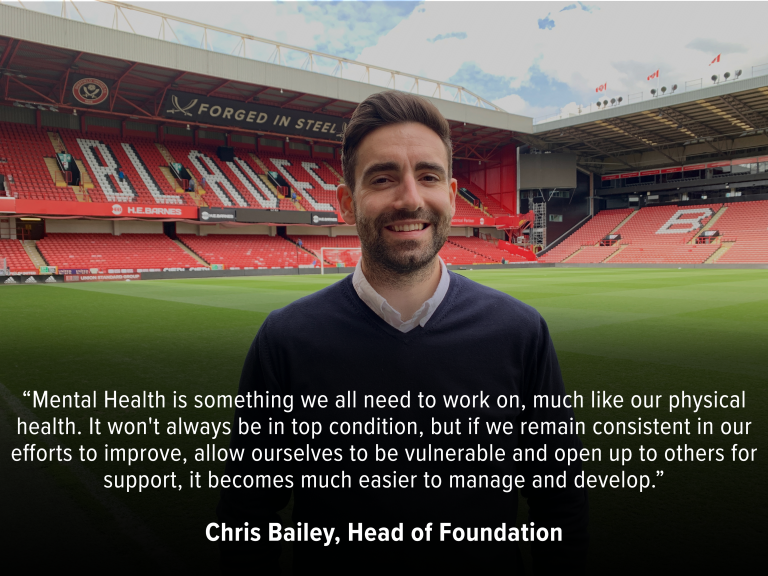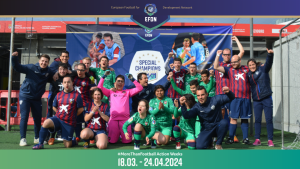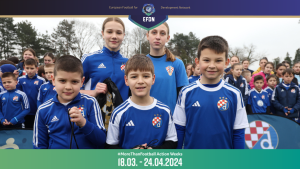Action Day – Mental Health
On 13 April we are calling all clubs, leagues and FAs to highlight their mental health initiatives.
Research conducted by the WHO shows how one person in every four will be affected by a mental disorder at some stage of their lives. To make this already dire mental health landscape even worse, the ongoing COVID-19 health crisis has had a dramatic impact on mental health worldwide. In fact, having to deal with anxiety, fear, isolation, social distancing and restrictions has brought emotional distress to many people. Also, people of color and all those whose lives have been marginalized by those in power experience life differently from those whose lives have not been devalued. They experience overt racism and bigotry far too often, which leads to a mental health burden that is deeper than what others may face. Racism is a mental health issue because racism causes trauma. And trauma paints a direct line to mental illnesses, which need to be taken seriously.
Football has to take a stand and raise awareness on these issues. You can join the #Morethanfootball Action Day in any way you want. We have gathered a few examples of how football organisations have implemented mental health programmes and some ideas for activities on World Mental Health Day below. Use #Morethanfootball and campaign material whenever you communicate about this topic.
Club Brugge
In the presence of Mayor Dirk De Fauw, Alderman for Welfare Pieter Marechal and Alderman for Culture Nico Blontrock, the newest Foundation project Football Memories was presented recently. Club legend Raoul Lambert was the first to discover the sports bag full of football memories. The football bag is meant to help caregivers and care teams to remind seniors with (early) dementia of the rich football history of their favourite club, EFDN member Club Brugge.
This project is an initiative of ‘Bruges revolves around People’ in collaboration with Erfgoedcel Brugge, Cercle Brugge Community and Club Brugge Foundation. They are convinced that football is more than just playing games and scoring goals. It is striving together for a better society. A society where inclusion and diversity are celebrated and where we leave out loneliness and dementia. Only by working together can they invest optimally in the physical and mental health of the many Bruges supporters.
SUFC Foundation
Talk Club, the latest addition to SUFC Foundation‘s Mental Health Support programme, is a safe space where men aged 18+ can share feelings, listen, and meet like-minded people to help improve mental health. These sessions aim to reduce the risk of suicide amongst men, which is the biggest killer for men under the age of 45 (an average of 12 men take their own lives every day).
Chris Bailey, Head of Foundation, recently attended one of these sessions and said:
“The informal environment was very welcoming and made me feel at ease. The staff were warm and friendly and were easy to talk to. The session was flexible enough to be free flowing whilst making sure everyone was involved as much as they wanted to be and the group was very supportive. […] I had the opportunity to share my thoughts, feelings and emotions and I had the opportunity to listen to others. It was useful to talk openly about any subject without being judged. There were no preconceptions, just honest conversations and supportive people.”
Dr Delroy Hall, Sheffield United’s club chaplain, also attended a recent Talk Club and said:
“What is being provided is necessary. The mental health services, as far as I understand it, are pretty much overwhelmed. I suspect there are similar projects across the country and if there weren’t, many individuals suffering from mental illness would be neglected by the system. You may not consider what you are doing is hugely significant, but if you can keep another person alive for another day, that is something of immense value. […] I think the sessions are a place where troubled men can connect and realise they’re not on their own. The consistency of the group can create a place of safety, normalcy, routine and structure when their lives, at their worst moments, can be extremely chaotic.”
Big Hearts Community Trust
IDEAS FOR #MORETHANFOOTBALL ACTIVITIES
- highlight your mental health programmes
- encourage people to talk about mental health through video messages from coaches and (former) players
- raise money for mental health support
- inform about mental health support in your local community
- call your supporters to check-in on them and their mental health
- create a club specific playlist to lift the mood or your fans and beneficiaries
- share resources that could be useful to alleviate your supporters’ emotional distress





